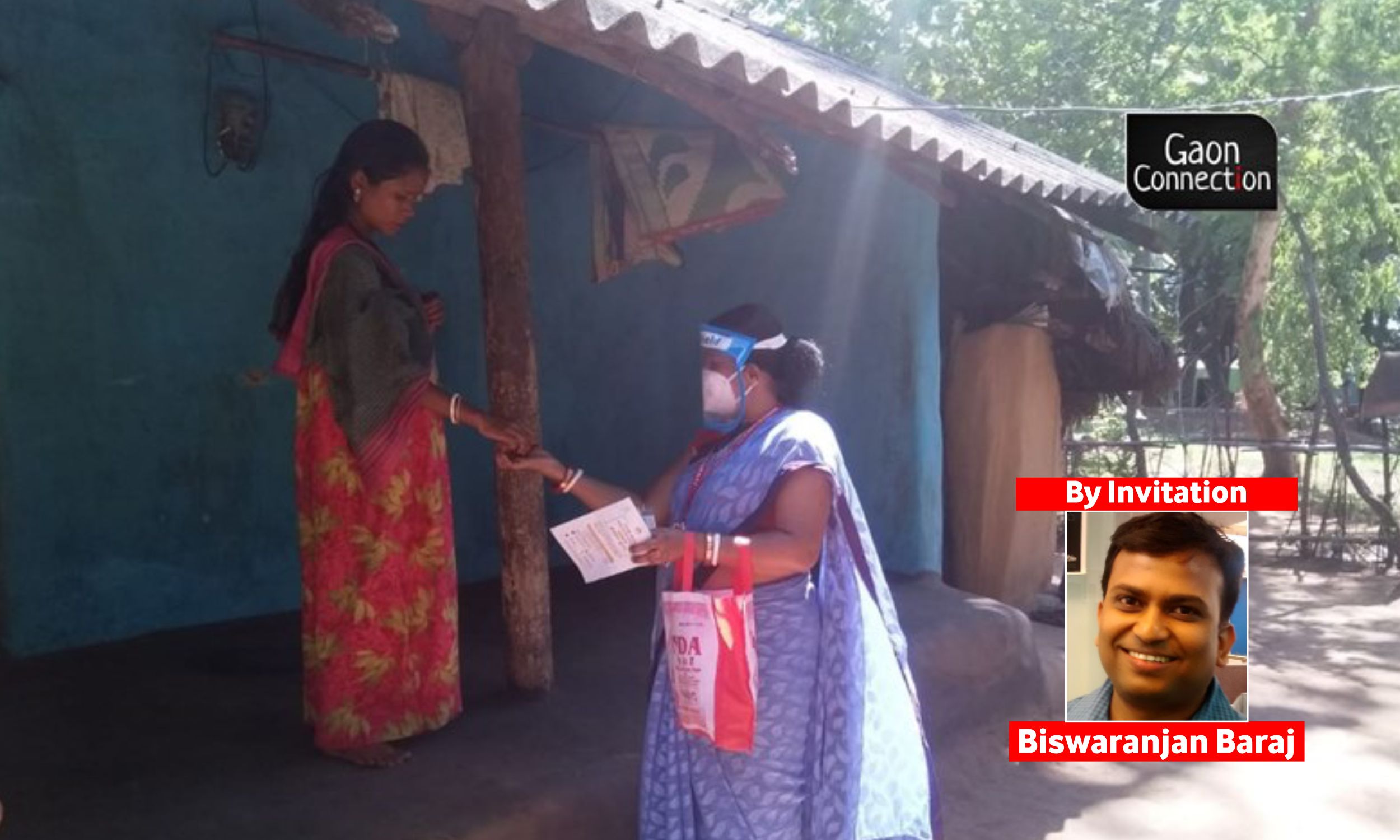COVID appropriate behaviour, learnings from Gaon Connection’s survey and preparing for the third wave
COVID appropriate behaviour is a powerful way to control the pandemic along with other measures. Gaon Connection’s third rural survey, conducted in December 2020, provides valuable insights related to knowledge, attitude and practices around COVID in rural India, and can help plan and prepare for the third wave in the country.


Creation of awareness about COVID appropriate behaviour and continuous monitoring of these by grassroot organisations like ASHA workers in rural areas is essential. Photo: By arrangement
No one is safe until everyone is safe. This powerful statement quoted widely in the context of the global pandemic reminds us how closely we are interconnected in a globalised society. It is important for each individual to be safe to control the spread of the COVID-19.
With official figure of more than 4.3 million deaths worldwide and more than 0.43 million deaths in India due to the coronavirus, and with its devastating impact on health, livelihood and economy, COVID-19 has posed one of the greatest challenges the humanity has ever witnessed in the recent history.
It has been widely recognised that following COVID appropriate behaviour is a powerful way to control this pandemic along with other measures. The COVID appropriate behaviour includes having correct knowledge about the disease and following various practices such as wearing mask, maintaining physical distance, avoiding touching eyes, nose and mouth, washing hands frequently and thoroughly, and avoiding crowded places.
Also Read: ‘Third wave may peak in India in October; paediatric facilities nowhere close to what is required’
Severe second wave after successfully managing first wave
India successfully minimised prevalence rate of COVID and mortality due to it during the first wave last year because of strict nationwide lockdown imposed from March 24, 2020 by the central government, which was relaxed gradually in various phases till November 2020.
As the following figure depicts the number of new COVID infections came down in last quarter of 2020 and the first quarter of 2021. Of course, because of strict lockdown, economy of the country was severely affected and visuals in media about plights of people, particularly migrant workers while returning their home, was heart-wrenching.
Source: The Hindu data team, August 14, 2021
Suddenly in April this year, daily new COVID infections and deaths climbed up astonishingly. India, which was appreciated for successfully managing the first wave in 2020, suddenly started to look helpless facing challenges of shortage of oxygen supply and hospital beds, particularly in April-May 2021. This period is known as ‘COVID second wave’ in India. The COVID second wave in the country was much more devastating than the first wave.
Also Read: 64% migrant workers were quarantined in villages, 9 in 10 didn’t undergo COVID-19 testing
There are many possible causes for the rapid surge of COVID, which include mutation of COVID virus, and the lack of following COVID appropriate behaviour. Following is an analysis of the status of COVID appropriate behaviour in rural India between the first and second waves of the pandemic, and its policy implications.
COVID appropriate behaviour in rural India between 1st and 2nd wave
Gaon Connection, India’s biggest rural media platform, conducted a field survey in a very crucial time in December 2020, between the first and the second waves, when number of COVID cases in India were limited. The survey report was published as ‘The Rural Report 3: COVID-19 Vaccine and Rural India’.
With a well-represented sample size of 6,000 respondents in 16 states and two Union Territories representing various geographies and socio-economic groups in India, this survey provided lots of valuable insights related to knowledge, attitude and practices of people about COVID in rural India where two-thirds of India’s population lives.
In the survey, twenty-two per cent rural respondents perceived that COVID was the failure of citizens to follow precautions which again highlights importance of COVID appropriate behaviour even in the perception of rural population.
When the respondents were asked if they thought the novel coronavirus was still around, about one-third of them did not think the virus was still there or they did not know about it. Similarly, around one-tenth of the respondents thought that COVID was just a rumour, another around one tenth of the respondents thought this to be exaggeration while another one-tenth of respondents thought that it was the disease of cities.
This type of perception of large chunk of rural population was risky to achieve COVID appropriate behaviour.
When asked about whether wearing a mask reduced the chance of spread of the coronavirus, about one-fifth of respondents did not think so or could not tell.
Also, when asked about whether people around the respondents wear a face mask when they step out in public places, about 57 per cent thought that people around them do so.
On being asked what precautions the respondent was taking to keep himself/herself and the family safe, 67 per cent said they were using face masks followed by 42 per cent using sanitisers or soap after touching of any object risky from COVID point of view. Physical distancing and avoid going to outside was reported to be practiced in nearly fifth of the respondents.
While it is encouraging to see large chunk of rural population had knowledge about COVID and the villagers were following COVID appropriate behaviour; the Gaon Connection survey conducted in December 2020 found that the awareness creation and sensitisation programme were reported in 58 per cent villages covered as part of the study. Thus, it reflects there was further scope of improvement of coverage of COVID related campaign to change people’s behaviour in rural India.

Lessons learnt and policy implication
While the tragic and sad experiences of second wave of COVID-19 have still not erased from people’s memory, experts and policy makers have started planning for the third wave of COVID in India. The above findings of COVID survey in rural India by Gaon Connection has a lot of significance in managing this global pandemic through effective management of people’s COVID related behaviour.
While strict imposition of lockdown was important to control COVID cases, following of COVID appropriate behaviour after lockdown should be carefully monitored. There is chance of creation of false narrative that easing of lockdown and restrictions means reign over the disease.
So, after easing of the COVID restrictions, creation of awareness about COVID appropriate behaviour, strict implementation of those directions and continuous monitoring of these by the government officials involving grassroot organisations like NGOs, health workers, ASHA and anganwadi workers and panchayat raj institutes in rural areas is essential.

Changing people’s perception and attitude takes long time. COVID is here to stay for long time. To change people’s perception, there is a need of sustained long-term efforts. Government of India, state governments and judiciary of India (through its judgements) have been promoting COVID appropriate behaviour. The central government is raising awareness through its various campaigns and is disseminating information through its various websites. Also, the NITI Aayog’s behaviour change campaign and a dedicated website is praise worthy.
Unlike disaster like cyclone and earthquake whose area of impact is geographically limited, pandemic like COVID does not respect geographical boundary. The control of the pandemic warrants strict adherence to COVID appropriate behaviour which is important in a large country like India having a diverse population of around 1.3 billion.
COVID is still here and the responsibility of managing and control of this highly contagious disease lies with each one of us.
Gaon Connection Insights’ ‘The Rural Report 3: COVID-19 Vaccine and Rural India’ is available for a free download here.
Biswaranjan Baraj is a senior development professional working on the issues of social and economic development, public policy and sustainability. Views are personal.

